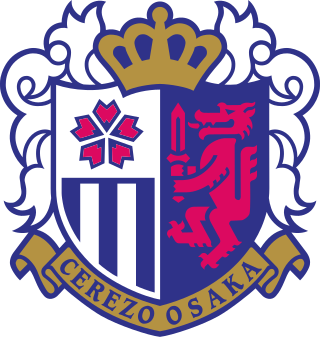Related Research Articles

Cerezo Osaka is a Japanese professional football club based in Osaka. The club currently plays in the J1 League, which is the top tier of football in the country. The club's name Cerezo is also the flower of the city of Osaka. The official hometowns of the club are Osaka and Sakai. They form a local rivalry with Suita-based Gamba Osaka.
The 2000 Men's Ice Hockey World Championships were the 64th such event organized by the International Ice Hockey Federation. 42 teams representing their countries participated in several levels of competition. The competition also served as qualifications for division placements in the 2001 competition.
The 1987 Ice Hockey World Championships was the 52nd such event hosted by the International Ice Hockey Federation. It was also the 63rd European Championships. Teams representing 28 countries participated in four levels of competition.

The 1986 Ice Hockey World Championships took place in the Soviet Union from 12 to 28 April. The games were played at the Luzhniki Palace of Sports and the CSKA Ice Palace in Moscow, and eight teams took part. Each team played each other once, and then The four best teams then played each other once more with no results carrying over, and the other four teams played each other again to determine ranking and relegation. This was the 51st World Championships, and also the 62nd ice hockey European Championships. The reigning world champions from Czechoslovakia finished fifth, and the Soviet Union became World Champions for the twentieth time, and also won their 24th European Championship. In the European Championship, only mutual games between European teams in the first round were counted. For the disappointing Czechoslovaks, this was the first time since 1967 that they had finished out of the medals, and their worst result outside the Olympics since 1937.
The 1965 season in Japanese football saw the formation of the Japan Soccer League, the first national league in Japan for football clubs. Eight teams took part in the championship, playing on a home and away basis. Toyo Industries were crowned the first ever champions, whilst Nagoya Mutual Bank came bottom and entered and end of season promotion/relegation match to stay in the top flight. They won this, 6–3 on aggregate against Nippon Kokan.
The 1973 season of Japanese football.
Both divisions of the Japan Soccer League were given the 3-1-0 league format.

The 2009 IIHF World Women's Championships was held in Hämeenlinna, Finland, from April 4 to 12, 2009. This was the 12th women's championship run by the International Ice Hockey Federation (IIHF). The defending champions United States defeated Canada 4–1 in the final match to win the gold medal and retain their top standing another year.
Statistics of Japan Soccer League for the 1976 season.
Statistics of Japan Soccer League for the 1977 season. This was the inaugural season of the Regional League promotion series, which replaced the Senior Cup as the source of the clubs promoted from the regional Japanese football leagues.
Statistics of Japan Soccer League for the 1978 season.
Statistics of Japan Soccer League for the 1980 season. For the first time ever, automatic promotion and relegation was introduced for the first and last places of the Second Division, which means that the last place in the First Division went down.
1982 was the 18th season of the Japan Soccer League.

The 2011 IIHF World Women's Championships was held in April 2011 in Zürich and Winterthur, Switzerland, and took place at Hallenstadion and Deutweg rink. This was the 13th women's championship run by the International Ice Hockey Federation (IIHF). The United States were the defending champions and defended their title, capturing their third straight gold medal by defeating Canada 3–2 in overtime on a goal by Hilary Knight. IIHF council member Monique Scheier-Schneider presided over the events.
The 1999 IIHF World U18 Championships was the first of its kind, It was held between April 8 and 18, 1999, in Füssen and Kaufbeuren, Germany. It replaced the European Under 18 Championship at the top two levels, by including one nation, the United States. Below the top two levels two tiers of European divisions played, as well as two tiers of Asian divisions.
The 2015 Meiji Yasuda J2 League season was the 44th season of the second-tier club football in Japan and the 17th season since the establishment of J2 League. The season began on 8 March 2015 and ended on 23 November 2015.
The 2014 Japanese Regional Leagues were a competition between parallel association football leagues ranking at the bottom of the Japan Football League.
Statistics of Japanese Regional Leagues in the 2014 season.
The 2016 Japanese Regional Leagues were a competition between parallel association football leagues ranking at the bottom of the Japan Football League.
The 2017 Japanese Regional Leagues were a competition between parallel association football leagues ranking at the bottom of the Japan Football League.